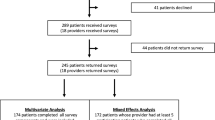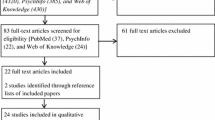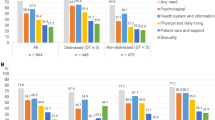Abstract
Genetic test results have medical implications beyond the patient that extend to biological family members. We examined psychosocial and clinical factors associated with communication of genetic test results within families. Women (N = 1080) diagnosed with breast cancer at age 40 or younger completed an online survey; 920 women that reported prior cancer genetic testing were included in analysis. We examined the proportion of immediate family members to whom they communicated genetic test results, and built multivariable regression models to examine clinical and psychosocial variables associated with the proportion score. Participants were most likely to communicate test results to their mother (83 %) and least likely to their son (45 %). Participants who carried a BRCA mutation (OR = 1.34; 95 % CI = 1.06, 1.70), had higher interest in genomic information (OR = 1.55; 95 % CI = 1.26, 1.91) and lower genetic worry (OR = 0.91; 95 % CI = 0.86, 0.96) communicated genetic test results to a greater proportion of their immediate family members. Participants with a BRCA1/2 mutation shared their genetic test results with more male family members (OR = 1.72; 95 % CI = 1.02, 2.89). Our findings suggest that patients with high worry about genetic risks, low interest in genomic information, or receive a negative genetic test result will likely need additional support to encourage family communication.
Similar content being viewed by others
References
Ashida, S., Goodman, M., Pandaya, C., Koehly, L., Lachance, C., Stafford, J., & Kaphingst, K. (2011). Age differences in genetic knowledge, health literacy, and causal beliefs for health conditions. Public Health Genomics, 14, 307–316.
Ashida, S., Goodman, M., Stafford, J., Lachance, C., & Kaphingst, K. (2012). Perceived familiarity with and important of family health history among a medically underserved population. Journal of Community Genetics, 3(4), 285–295.
Biesecker, L. G., Mullikin, J. C., Facio, F. M., Turner, C., Cherukuri, P. F., Blakesley, R. W., & Green, E. D. (2009). The ClinSeq project: piloting large-scale genome sequencing for research in genomic medicine. Genome Research, 19(9), 1665–1674.
Bradbury, A. R., Patrick-Miller, L., Egleston, B. L., Olopade, O. I., Daly, M. B., Moore, C. W., et al. (2012). When parents disclose BRCA1/2 test results: their communication and perceptions of offspring response. Cancer, 118(13), 3417–3425.
Cameron, L. D., & Reeve, J. (2006). Risk perceptions, worry, and attitudes about genetic testing for breast cancer susceptibility. Psychology & Health, 21(2), 211–230.
Chaturvedi, S. K., Strohschein, F. J., Saraf, G., & Loiselle, C. G. (2014). Communication in cancer care: psycho-social, interaction, and cultural issues. A general overview and the example of India. Frontiers in Psychology, 5, 1332.
Cheung, E. L., Olson, A. D., Yu, T. M., Han, P. Z., & Beattie, M. S. (2010). Communication of BRCA results and family testing in 1,103 high-risk women. Cancer Epidemiology, Biomarkers & Prevention, 19(9), 2211–2219.
de Sanjosé, S., Leone, M., Berez, V., Izquierdo, A., Font, R., Brunet, J. M., & Bosch, F. X. (2003). Prevalence of BRCA1 and BRCA2 germline mutations in young breast cancer patients: a population-based study. International Journal of Cancer, 106(4), 588–593.
Deimling, G. T., Bowman, K. F., Sterns, S., Wagner, L. J., & Kahana, B. (2005). Cancer-related health worries and psychological distress among older adult, long-term cancer survivors. Psycho-Oncology, 15(4), 306–320.
Diefenbach, M., & Leventhal, H. (1996). The common-sense model of illness representation: theoretical and practical considerations. Journal of Social Distress and the Homeless, 5(1), 11–38.
Finlay, E., Stopfer, J. E., Burlingame, E., Evans, K. G., Nathanson, K. L., Weber, B. L., et al. (2008). Factors determining dissemination of results and uptake of genetic testing in families with known BRCA1/2 mutations. Genetic Testing, 12(1), 81–91.
Forrest, K., Simpson, S. A., Wilson, B. J., van Teijlingen, E. R., McKee, L., Haites, N., & Matthews, E. (2003). To tell or not to tell: barriers and facilitators in family communication about genetic risk. Clinical Genetics, 64, 317–326.
Gaff, C. L., Clarke, A. J., Atkinson, P., Sivell, S., Elwyn, G., Iredale, R., et al. (2007). Process and outcome in communication of genetic information within families: a systematic review. European Journal of Human Genetics, 15(10), 999–1011.
Gotay, C. C., & Pagano, I. S. (2007). Assessment of survivor concerns (ASC): a newly proposed brief questionnaire. Health and Quality of Life Outcomes, 5(1), 15–11.
Guth, U., Huang, D. J., Alder, J., & Moffat, R. (2015). Family ties: young breast cancer patients and their children. Swiss Medical Weekly, 145, 1–6.
Hamilton, R. J., Bowers, B. J., & Williams, J. K. (2005). Disclosing genetic test results to family members. Journal of Nursing Scholarship, 37(1), 18–24.
Hay, J. L., Buckley, T. R., & Ostroff, J. S. (2005). The role of cancer worry in cancer screening: a theoretical and empirical review of the literature. Psycho-Oncology, 14(7), 517–534.
Hay, J. L., Kaphingst, K. A., Baser, R., Li, Y., Hensley-Alford, S., & McBride, C. M. (2012). Skin cancer concerns and genetic risk information-seeking in primary care. Public Health Genomics, 15(2), 57–72.
Jensen, J. D., Bernat, J. K., Davis, L. A., & Yale, R. (2010). Dispositional cancer worry: convergent, divergent, and predictive validity of existing scales. Journal of Psychosocial Oncology, 28(5), 470–489.
Koehly, L. M., Peterson, S. K., Watts, B., Kempf, K., Vernon, S., & Gritz, E. (2003). A social network analysis of communication about hereditary nonpolyposis colorectal cancer. Genetic Testing and Family Functioning, 12, 304–313.
Koopman, H., Baars, R., Chaplin, J., & Zwinderman, K. (2004). Illness through the eyes of the child: the development of children’s understanding of the causes of illness. Patient Education and Counseling, 55, 363–370.
Leventhal, H., Benyamini, Y., Brownlee, S., Diefenbach, M. A., Leventhal, E. A., Patrick-Miller, L., & Robitaille, C. (1997). Illness representations: Theoretical foundations. In K. H. Petrie & J. A. Weinman (Eds.), Perception of health and illness (pp. 19–46). Amsterdam: Harwood Academic Publishers.
Marteau, T., & Weinman, J. (2006). Self-regulation and the behavioural response to DNA risk information: a theoretical analysis and framework for future research. Social Science & Medicine, 62, 1360–1368.
McBride, C. M., Hensley-Alford, S., Reid, R. J., Larson, E. B., Baxevanis, A. D., & Brody, L. C. (2009). Characteristics of users of online personalized genomic risk assessments: implications for physician-patient interactions. Genetics in Medicine, 11(8), 582–587.
McGivern, B., Everett, J., Yager, G. G., Baumiller, R. C., Hafertepen, A., & Saal, H. M. (2004). Family communication about positive BRCA1 and BRCA2 genetic test results. Genetics in Medicine, 6(6), 503–509.
Mendes, A., Paneque, M., Sousa, L., Clarke, A., & Sequeiros (2016). How communication of genetic information with family is addressed in genetic counseling: a systematic review of research evidence. European Journal of Human Genetics, 24, 315–325.
Parrott, R. L., Silk, K., Raup Krieger, J., Harris, T., & Condit, C. (2004). Behavioral health outcomes associated with religious faith and media exposure about human genetics. Health Communication, 16(1), 29–45.
Rabin, C., & Pinto, B. (2006). Cancer-related beliefs and health behavior change among breast cancer survivors and their first-degree relatives. Psycho-Oncology, 15(8), 701–712.
Shiloh, S., Wade, C. H., Roberts, J. S., Alford, S. H., & Biesecker, B. B. (2013). Associations between risk perceptions and worry about common diseases: a between- and within-subjects examination. Psychology & Health, 28(4), 434–449.
Taber, J. M., Chang, C. Q., Lam, T. K., Gillanders, E. M., Hamilton, J. G., & Schully, S. D. (2014). Prevalence and correlates of receiving and sharing high-penetrance cancer genetic test results: findings from the health information national trends survey. Public Health Genomics, 1–11.
Wiseman, M., Dancyger, C., & Michie, S. (2010). Communicating genetic risk information within families: a review. Familial Cancer, 9(4), 691–703.
Young, S. R., Pilarski, R. T., Donenberg, T., Shapiro, C., Hammond, et al. (2009). The prevalence of BRCA1 mutations among young women with triple-negative breast cancer. BMC Cancer, 9, 86.
Author information
Authors and Affiliations
Corresponding author
Ethics declarations
Funding
This study was funded by R01 CA168608. Effort for BBB was supported by the National Human Genome Research Institute’s Intramural Research Program.
Conflict of Interest
Ashley Elrick, Sato Ashida, Jennifer Ivanovich, Sarah Lyons, Barbara B. Biesecker, Melody S. Goodman and Kimberly A. Kaphingst declare that they have no conflict of interest.
Human Subjects and Informed Consent
All procedures followed were in accordance with the ethical standards of the responsible committee on human experimentation (institutional and national) and with the Helsinki Declaration of 1975, as revised in 2000. Informed consent was obtained from all patients for being included in the study.
Animal Studies
No animal studies were carried out by the authors for this article.
Rights and permissions
About this article
Cite this article
Elrick, A., Ashida, S., Ivanovich, J. et al. Psychosocial and Clinical Factors Associated with Family Communication of Cancer Genetic Test Results among Women Diagnosed with Breast Cancer at a Young Age. J Genet Counsel 26, 173–181 (2017). https://doi.org/10.1007/s10897-016-9995-0
Received:
Accepted:
Published:
Issue Date:
DOI: https://doi.org/10.1007/s10897-016-9995-0




